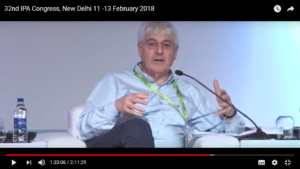Richard Charkin, Director, Bloomsbury’s address at IPA Congress, 11-13 Feb 2018, Delhi

 From 11-13 February 2018 the 32nd International Publishers Association (IPA) Congress was held at Taj Palace Hotel, New Delhi. The International Publishers Association (IPA) is the world’s largest federation of national, regional and specialist publishers’ associations. Its membership comprises 70 organisations from 60 countries in Africa, Asia, Australasia, Europe and the Americas. The congress was organised in Delhi along with the collaboration of the Federation of Indian Publishers ( FIP).
From 11-13 February 2018 the 32nd International Publishers Association (IPA) Congress was held at Taj Palace Hotel, New Delhi. The International Publishers Association (IPA) is the world’s largest federation of national, regional and specialist publishers’ associations. Its membership comprises 70 organisations from 60 countries in Africa, Asia, Australasia, Europe and the Americas. The congress was organised in Delhi along with the collaboration of the Federation of Indian Publishers ( FIP).
It was a wonderful congress with multiple panel discussions that fortunately ran in succession rather than in parallel and many fascinating conversations were to be had on the sidelines. It was a phenomenal gathering of publishers from around the world. The full programme can be accessed here.
On the first day of the congress the morning session included a Global Leaders Forum discussion led by the NITI Ayog CEO Amitabh Kant. The panelists included: Dr. Y. S. Chi, Elsevier, USA; Matt Kissner, John Wiley, USA and Richard Charkin, Bloomsbury. The panel discussion can be heard in the YouTube link given below. It was interesting to hear these global leaders of publishing, across different formats of publishing — academic and trade, share many similar concerns and talk about the growth of business.
 Richard Charkin’s address ( heard from 1:33:30 mins in the link) was particularly pertinent, for here was a seasoned publisher sharing his experiences of many decades in the industry as well as offering great perspectives on how to deal with the future of this business. His mantra of “paying attention to authors” which is often tragically forgotten is worth paying heed to if the industry has to grow globally. Here is the edited version of my notes with inputs from Richard Charkin.
Richard Charkin’s address ( heard from 1:33:30 mins in the link) was particularly pertinent, for here was a seasoned publisher sharing his experiences of many decades in the industry as well as offering great perspectives on how to deal with the future of this business. His mantra of “paying attention to authors” which is often tragically forgotten is worth paying heed to if the industry has to grow globally. Here is the edited version of my notes with inputs from Richard Charkin.
****
Speaking from my experience in general book publishing and academic and educational publishing particular issues affect English language markets. Predictions are a fools game! I shall focus on what will be my hope for the future.
- 1980-90s — all about book marketing. Leaders frequently came from sales end of business.
- ’00s/noughts – Focus on technology and logistics. “How else do we get better? Distribution? Growing size? Complexity of retailers? This resulted in the business people leading companies. We now have very few companies led by publishers.
- 2010s- Where are our profits? Returning to our roots — IPR, authorship, how well are we serving our authors?, how does it compare to the growth in self publishing?, What value can we add for the customer/author? ( “Our customer is the author, as well as and arguably more than the reader or retailer”)
- We get the responsibility of developing the authors by selling rights throughout the world.
If only we could kick the habit of overpaying very successful authors. Thus we have created a system where established authors with large unearned advances authors are effectively being subisdised by the less successful. Without unearned advances we could perhaps pay a higher overall royalty rate. - Control wastage. Even if we halve costs the impact on our bottomlines would be substantial.
Retailers would then become less than not diverse. Resist monopolistic control of some retailers. Editors would get back into leadership positions, which is really at the core of publishing roles. Also they would become more professional and understand the markets better they serve. Understanding role of the editor is understanding readers and authors. Also it would do away with the egocentric role it has become of late. - We know what is “IQ” and later came “Emotional Intelligence” but I would like to emphasise on “Cultural Intelligence” which is the recognition of differences between old and young, rich and poor, one country and another, understanding boundaries globally and internationally with different cultures. We have a core, we need to recognise the bits around the edges.
We need to work together to build a global industry. Most importantly serve our authors.
13 July 2018



